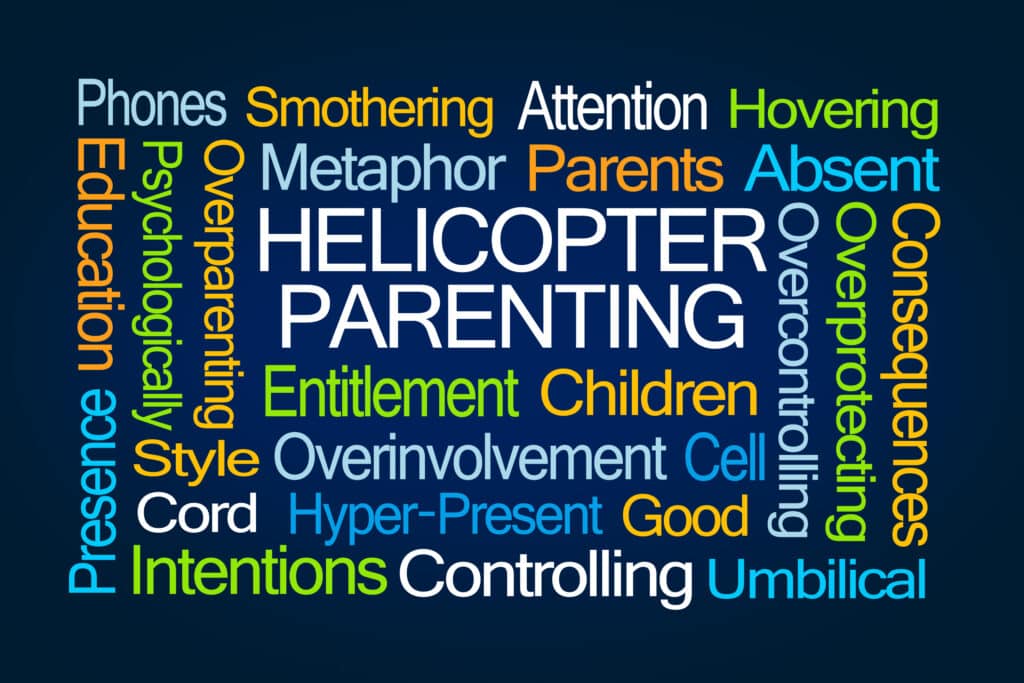These crafts not only keep the kids entertained, but help you add some new Halloween decorations to your collection.
Helping a child through the college admissions process is one of the most rewarding, yet challenging moments in parenthood.
As kids prepare to leave the nest, many parents find themselves feeling a mixture of pride, anxiety and uncertainty as they try to seek a balance between being supportive while encouraging independence.
After nearly two decades of caring for their child every step of the way, this new role can be tough to grasp.
Just ask Brennan Bernard, who has seen it play out from both sides — first as a parent and also through his work as a college counselor and admissions officer.
“If there is ever a time when our children need us to be balanced and calm, it is during the college admission experience,” Bernard writes in a Forbes article, published March 30.
But what does that mean to a parent who is left with more questions than answers on how to best support their child through this process?
For most parents, it means embracing the change — but never missing an opportunity to teach.
“We’re all supposed to be parenting for the day when we’re no longer able to be their primary support,” says bestselling author Julie Lythcott-Haims, per a 2022 Forbes article.
“We need to know that we’ve done our best to teach them to do as much for themselves as possible given their circumstance,” she adds.
It’s a concept even celebrities have to face in their own parenting journeys.
“The sad part about motherhood is that you’re raising the one person you can’t live without… to be able to live without you,” Kim Kardashian wrote in a Nov. 9 Instagram Story.
It also means turning to veteran parents who have already learned the various “do’s” and “don’ts” of sending a child off to college through their own experience.
“Whether potty training, learning to drive, or applying to college, the reflections of veteran parents were much more valuable than those trying to muddle through it like me,” Bernard added in his post.
That’s why we’ve gathered some of the best advice from parents and professionals who have been there before — because we could all (even parents) use a little guidance from time to time.
Here’s what we found!
Let your child know you’re proud of them

The application and admission process is the final step in your child’s long, four-year high school journey — but it’s also the first step in an entirely new journey.
Letting your child know that you’re proud of them helps validate all the hard work and effort they’ve put in thus far. It also motivates them to continue that effort as they enter this new era.
“They are no different from us when we put in the work and accomplish a long-term goal,” writes Kavita Varma-White, a senior parents editor for TODAY and mother of two.
“They want to hear ‘job well done.’ So tell them, as often as you can, how proud you are,” she adds.
Chris Gruber, Vice President and Dean Of Admission and Financial Aid at Davidson College, shares a similar sentiment.
“Let them know early that they are loved, that you are proud of them, and that you have every confidence in them in finding the next academic home that will be right for them,” he tells Bernard.
Embrace (and create) precious memories during the process

Sarah Harberson, a mother of three who describes herself as “America’s College Counselor,” stresses the importance of “showing up” for your children as they go through the admissions process.
“Taking your kids to visit colleges means showing up,” she writes in a July 2024 article. “My dad did that for me and I have the best memories with him from those trips.”
While Harberson warns of the many “arguments, tears, and memories” worth forgetting during this process, she argues that “showing up will give you many more memories to remember.”
And that’s exactly what Kelly Richards, Director of College Counseling at St. George’s School, did with her three children.
“On every trip with each of my three kids, we planned something fun along with the college visit,” she wrote, per Bernard. “It lessened any stress that existed and doubled the fun of each trip.”
Whether it’s sitting down at a popular local restaurant or finding a good place to watch the sunset together, it’s important to cherish the quality time you’ll get to spend with your child during these visits.
Set aside pre-planned time to talk about college

Don’t let “college talk” be the only thing you and your child discuss.
Parents often have plenty of questions and it’s natural to want updates on the process as they happen, but don’t let it take away from the quality time you spend with your children.
Instead, set aside planned time to discuss what’s new and what’s next.
As one parent advised during a 2024 presentation at their kids’ high school, “pick one 15-minute time slot per week to talk college with your kid.”
“It’ll keep you and your student from driving each other bananas through the process,” the parent added.
In other words, it gives you and your child a chance to discuss any updates without having “college talk” cloud over every activity you do together.
It also helps maintain a sense of normalcy outside of the chaos this process brings.
There’s more to college than chasing an A

College offers your child the chance to learn in an established institution — but that’s not all it offers.
While it’s important to find a school that your child will succeed at academically, parents should also respect their child’s desire to experience everything else that comes with their time away from home.
That’s why Maria Morales-Kent, the Director of College Counseling at Thacher School, suggests helping students find a school that not only stretches them but also affirms them.
“Going to a school where you are always chasing an A, can impact how or whether a student has the time or space to develop the other sides of themselves during this critical time,” she writes, per Bernard.
That’s the difference between choosing the best fit school vs. the best ranked school.
“Colleges and universities have an energy that is unique to that campus, a vibe or a feeling that resonates or doesn't,” writes Chris Lanser, IvyWise college admissions counselor, per U.S. News.
“Value the experience your child will have, not the sweatshirt they'll be wearing,” he adds.
Only share opinions when asked to give them

The college search process belongs to your child — not you.
While it's tempting to offer unsolicited advice on every school they're considering, experts suggest taking a step back and letting them form their own opinions first.
“When visiting campuses, ask what their impressions are but don’t offer your own unless they ask!” says Tim Pratt, Director of College Advisory, Spring Education Group, per Bernard.
“It is easy to assume that our kids will have the same preferences we do, but it is crucial to give them space to formulate their own without parental pressure,” he adds.
That means learning to listen first, and ask questions second.
Children often need space to process their thoughts — and a parent’s eager suggestions can shut down their own discovery process.
“There’s no way a student can succeed if what a student is being held up to is some mythical standard of someone else,” adds Keith Moon, associate dean of Harvard’s Summer School Program.
“This is the first adult decision of your children’s lives,” he adds. “It’s important to empower your children to make the decision that’s best for them.”
Be prepared to help financially

The financial reality of college is something every family must address openly and honestly.
“Parents should be very forthcoming with their child in the realm of financial aid,” says Joseph Walcott Lewis, associate director of Harvard Crimson Summer Academy, per Harvard Summer School.
He argues that having candid conversations about what your family can afford before applications begin can help prevent heartbreak and conflict later.
“It’s important across all incomes because the financial needs of the student in terms of what they can or can’t afford play a role in how students craft a list or how they can decide,” Lewis adds.
But no matter what your financial situation is, Rod Jackson — Regional Admission Representative at Hampden-Sydney College — implores parents to be prepared to “pay something.”
“That ‘something’ will vary based on your income and your child’s talents. Those full-ride opportunities DO still exist but are few and far between,” Jackson argues, per Bernard.
Avoid becoming a helicopter parent

While parents naturally want to manage every aspect of the college process, most experts agree on one simple principle — don’t be a helicopter parent.
According to Ann Dunnewold, PhD, a licensed psychologist, helicopter parenting is another term for “over-parenting.”
“It means being involved in a child's life in a way that is over-controlling, overprotecting, and over-perfecting, in a way that's in excess of responsible parenting,” Dunnewold says.
This doesn't mean abandoning your role as a parent. Instead, experts argue to think of yourself as a consultant rather than a manager.
“Just as they needed to balance when learning to ride a bike, if we don't let go, they will not learn how to right themselves on their own,” adds author Jenifer Lippincott, per a 2021 article published by Forbes.
Be prepared to learn new things about your child

The college admissions process often reveals sides of your child you may not have seen before.
That’s what Matthew DeGreeff, Dean of College Counseling and Student Enrichment at Middlesex School, tells Bernard of his experience going through the admissions process with his son.
“We may not know as well as we thought the person who is blossoming before us,” DeGreeff says, per Bernard.
“It is wonderful, exciting, powerful, and sometimes painful as a parent to have this happen, and I learned that I needed to see and get to know my child as an entirely new person,” he added.
This may mean accepting that your straight-A science student suddenly wants to explore creative writing, or that your homebodied teen is eyeing schools across the country.
Or, for sports fans, it might mean watching them go to a rival of your own alma mater.
“Imparting some wisdom and guidance to our students is exemplary,” writes Lori Smith, per Grown & Flown.
“However, it is not OK to pressure them into becoming involved in the things that gave us the greatest joy or even our sense of identity,” she adds.
Know the difference between ‘likely,’ ‘target’ and ‘reach’ schools

Creating a balanced college list is crucial for both practical outcomes and emotional wellbeing.
That’s why most experts recommend applications include a healthy mix of "reach," "target," and "likely" schools to ensure your child has options when decision time arrives.
Reach schools are those that the child will likely be turned away from. Target schools generally give the student a 50% shot at admission, while likely schools give them a high chance at admission.
Campus Bound suggests applying to eight schools — two reach, two likely and four target schools.
“Try to avoid getting caught up in the name game of colleges at the expense of your student,” adds Elena Polin, per Scoir.
“In the end, who cares if people don’t recognize the name of your student’s college, if your student is happiest there?” she questions.
Help your child build character — not just credentials

In today's competitive college landscape, it's easy to fall into the trap of viewing every activity through the lens of how it will look on an application.
But most colleges today aren’t focused on “resume-builders.” Instead, they want to see that your child is taking part in things they’re passionate about.
“I frequently advise parents to encourage their teens to pursue genuine interests rather than filling their schedules with résumé-padding activities,” says college admissions expert Dr. Aviva Legatt, per LinkedIn.
“Authentic interests shine through in applications and, more importantly, allow teens to enjoy and learn from their experiences,” she adds. “College admissions officers are always looking for this authenticity.”
Parents can help their kids by exploring the kinds of community service or ongoing contributions that are likely to be meaningful to them.
Discuss with them why one does service and check in with them about their service experience often.
Breathe, be patient and stay calm

Every year, as part of their “College Hopes and Worries Survey,” The Princeton Review asks respondents what advice they have for next year’s parents of college applicants.
In 2022, one parent, who goes by the name Spencer, summed up the admissions process to perfection.
“It's the admissions process that's crazy, not you,” he writes.
Another parent, Jacqueline, wrote, “Don’t let the stresses overwhelm you to the point that you cannot enjoy this part of life’s journey with your child.”
As you and your child go through this long and arduous journey, it’s important to trust the process, trust your child’s intuition and trust that you’ve given them the tools to make the right decision.
Even if it’s not the decision you would’ve made.
“It turns out that when we actively stop helicoptering, a funny thing happens: They survive,” writes TODAY editor Kavita Varma-White.
“Your only responsibility is to ask what support they need and provide it where you can. If they say they don’t need anything, don’t question it,” she adds.
That’s why Varma-White has one simple mantra for parents to follow during the process: “Calm down.”












